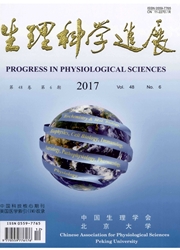

 中文摘要:
中文摘要:
糖尿病及其并发症是覆盖全球的常见疾病,发病率逐年增高。硫化氢是继一氧化氮和一氧化碳之后的第三种气体信号分子,发挥重要病理生理学效应。目前研究发现,硫化氢在调节胰岛β细胞功能、胰岛素抵抗和糖尿病并发症中发挥着重要作用,已经成为糖尿病及其并发症的研究热点。本篇综述就H2S在糖尿病及其并发症中发挥的病理生理学作用及机制进行了阐述。
 英文摘要:
英文摘要:
Diabetes and its complications continue to be an increasing global health problem. Hydrogen sulfide( H2S) has emerged as the third gasotransmitter following the nitric oxide and carbon monoxide in the body,and plays an important role in both physiology and pathophysiology. Recent work has suggested important roles for H2S in the regulation of pancreatic β-cell function,as well as development of insulin resistance and diabetic complications. Targeting H2S represents a novel therapeutic approach in diabetes and its associated complications. This review article summarizes the current body of evidence regarding the role of H2S in diabetes mellitus,and especially in its associated vascular complications,as well as the underlying signaling mechanisms.
 同期刊论文项目
同期刊论文项目
 同项目期刊论文
同项目期刊论文
 17ss-estradiol antagonizes the down-regulation of ERalpha/NOS-3 signaling in vascular endothelial dy
17ss-estradiol antagonizes the down-regulation of ERalpha/NOS-3 signaling in vascular endothelial dy l-Tetrahydropalmatine, an active component of Corydalis yanhusuo W.T. Wang, protects against myocard
l-Tetrahydropalmatine, an active component of Corydalis yanhusuo W.T. Wang, protects against myocard GYY4137protects against myocardial ischemia and reperfusion injury by attenuatingoxidative stress an
GYY4137protects against myocardial ischemia and reperfusion injury by attenuatingoxidative stress an 期刊信息
期刊信息
